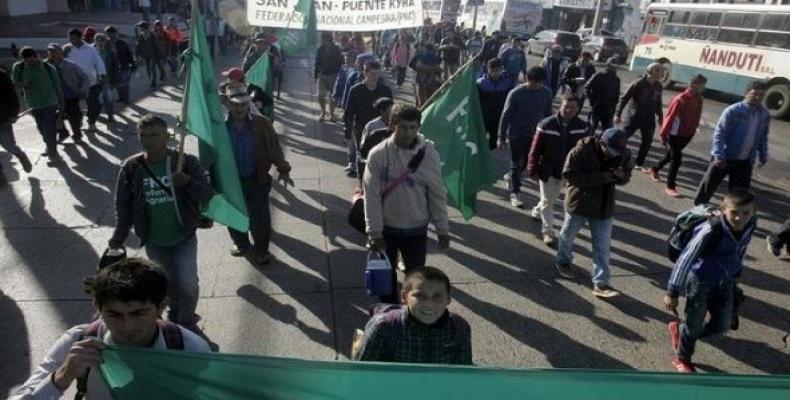Asunción, March 25 (RHC)-- In Paraguay, a crowd of some 5,000 campesinos demonstrated for equal land rights, reigniting an age-old battle for agrarian reform. Demonstrators marched through the capital city of Asuncion during the XXVI March of the Poor Peasant, carrying banners with the slogan: “Land and production for national development, building popular power.”
Teodolina Villalba, the general secretary of the National Peasant Federation (FNC), said: "There will be no peace in Paraguay while the authorities continue to ignore the right of the peasantry to their own land. “The most unequal land in the world, where a large landowner and agro-export minority, largely foreign, concentrates 90% of the land, while the remaining 10% is distributed among 280,000 small and medium producers. "We are mobilizing to demand the government's own land and to end the concentration in the hands of a privileged few," Villalba concluded.
Paraguay’s agribusiness model drove an “exodus of peasants and Indigenous people from the countryside to the city, generating poverty and misery" where the law is governed by a capitalist "market where everything is bought and sold: the people, the homeland, honor, dignity," Villalba told the crowd of protesters.
"Seven months ago (President Mario Abdo Benitez) assumed and does not even smell the needs of the people," the FNC general secretary said. "The economic crisis is accentuated more and more: factories are closed, jobs are lost, while Mario Abdo Benitez is traveling around the world... when it does not generate violent evictions."
Recent statistics show that over 85 percent of arable land belongs to only two percent of the population, while poverty hovers around 26.4 percent and 40 percent of Paraguayans are employed in informal work.
Economist researcher Gladys Benegas said that “just over 63% of producers operate on land of less than 10 hectares, but they represent little more than 2% of the total agricultural area. "The issues that aggravate inequality are the existence of widespread insecurity of tenure, since approximately 27% of producers lack rights to the land they operate, and another 36% operate on illegal occupations."
The only hope for Paraguay’s future is one to correct these mistakes now and create a new country that’s “not only of the peasantry, but also of workers and workers, students, women, young people, Paraguayan immigrants to other countries forced by necessity, the new homeland that is the hope of the poor, the excluded and also those who long for a sovereign and democratic country."


